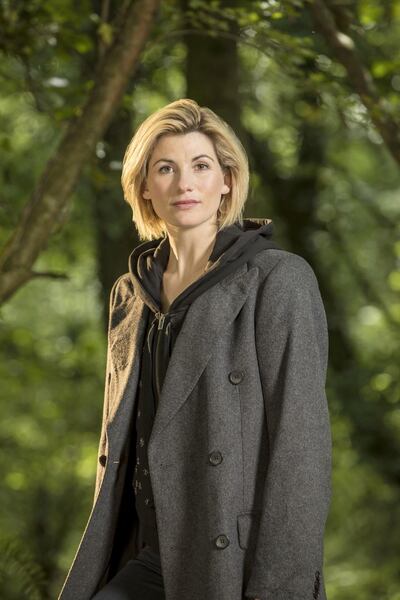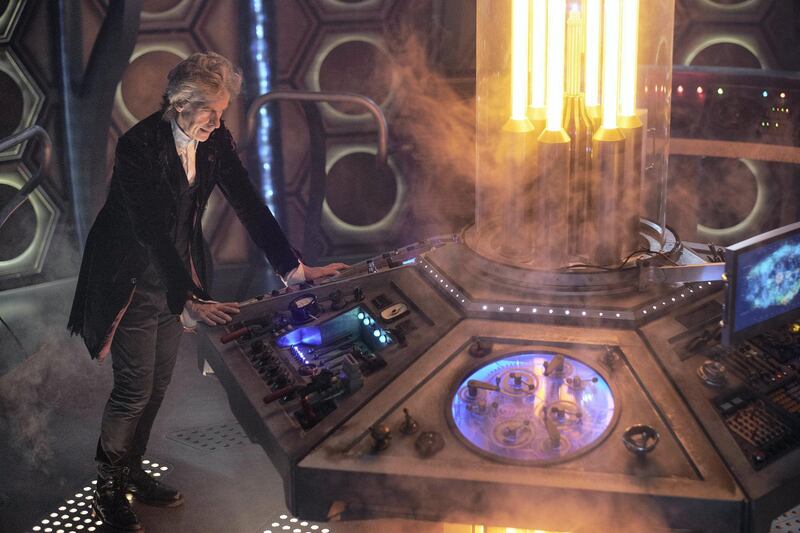What's the greatest television show ever made? It's the kind of thorny question you can just imagine being thrown around festive dinner tables this week as people open box-sets of Game of Thrones, The West Wing or Twin Peaks. You might expect Doctor Who's outgoing showrunner Steven Moffat – who, let's not forget, is also responsible for the brilliant Sherlock – to put the BBC's long-running science fiction extravaganza in that company. But for him, there's no comparison.
"Now I'm leaving I can say it," he says, eyes sparkling after the world premiere of this year's Doctor Who Christmas Special. "Doctor Who is the greatest television show ever made. And I can prove it.
"How do we measure greatness? By ratings or reviews? Of course not. Is Doctor Who perfect every week? No, and it can't be, because every episode is an experiment. Actually, perfection is the refinement of boredom by doing the same thing every week, and Doctor Who is always different. So we measure greatness by the fact that people have become writers, artists, actors, musicians and scientists because of Doctor Who. People have changed what they thought they were capable of because of a silly show about a man who travels around in time and space in a police box. Count the hearts that beat a little faster because of Doctor Who."
It's a beautiful way of looking at the huge impact of the show over its 54 years and 12 Time Lords – and goes some way to explaining just why the Christmas special is so emotional. The episode starts where the final scene of The Doctor Falls (July's season finale) ended, with Peter Capaldi's Doctor seemingly refusing to do the inevitable and regenerate into someone else.
In a snowscape, he meets the very first Doctor, also trying to put off his regeneration. Well, kind of: the original 1960s actor William Hartnell is dead, so David Bradley, as he has in the past, plays his role. It would be mean to plot spoil too much, but what happens next involves a return for Capaldi’s assistant Bill (Pearl Mackie), a British army captain plucked from a First World War battlefield (Mark Gatiss) and the mysterious, glassy Testimonies, who harvest people’s memories.
There’s no saving of the world to be done, just the inexorable passing of time as the episode reaches its heartbreaking yet hugely uplifting denouement with Capaldi pondering his life and finally regenerating… into the first female Doctor, Jodie Whittaker. Tonally, it feels very much like the end of an era rather than the beginning of a new one.

"It was hugely emotional watching his final speech in the Tardis," says Moffat. "And it was an odd one to write. I didn't want a story where he would be fighting his last battle or defining who he is, because that's what he does in The Doctor Falls. I wanted to give him a reason to come back, to see a loving universe and realise that he has a part to play in that. To put him face to face with characters from the future who weren't really doing anything evil at all – and through them realise that he could give it one more go."
Moffat argues that "sometimes it's nice not to have baddies", but it's certainly a gamble for an adventure through space and time to have so little peril. Instead, it's Moffat's love letter to Doctor Who – as Mark Gatiss puts it, "everything brilliant and beautiful about Doctor Who is in this episode. It made my heart sing." Gatiss, of course, has written episodes for the show in the past and has now starred in it three times. How does he quantify Doctor Who now it feels like the end of a very defined chapter?
“Well, it’s been my favourite show since I was a very small child, so it’s been an amazing gift,” he says. “When I got the call to write for it, it was the best Christmas present I’ve ever had, and it’s been marvellous to do new things with it.
"The wonderful thing about this episode is that it's nostalgic now, if you see what I mean. A modern show, but like being in a Doctor Who annual, the old and the new at the same time. Everything I could have wanted, really. I cried."
Bradley says: "It's a wonderful thing to be a part of – and watching it now is almost overwhelming. I'm young enough to remember William Hartnell's Doctor, you see. On Saturday nights, we'd watch Doctor Who and then go out on the town. I never imagined I'd actually be in it." And the show has been a kind of rite of passage for so many actors, directors and – most importantly – fans of entertaining science fiction. It's why Pearl Mackie – who intriguingly says "that's the last episode I will ever do… maybe", calls the whole experience a whirlwind. "Being in Doctor Who never really leaves you," she says. "You're always a part of it."
_______________________
Read more:
[ WATCH: Doctor Who Christmas special trailer ]
[ Jenna Coleman: Casting a female Doctor Who is 'genius' ]
[ New Doctor Who is announced and it is female ]
_______________________
As Capaldi himself put it in a short statement: “It’s been an amazing trip. I went to the end of time, met fantastical creatures, and blew them up. But now it’s over. Time I was off.”
And time for Whittaker to inhabit the famous Tardis – and make it her own. As for Moffat, he says his stint on Doctor Who has been "nothing but joy… and terror and far too much work". But he has no doubt that the controls of the most famous police box in the universe are in safe hands.
"Yes, Doctor Who travels in space and time," he says. "But really, he's all about the 'now'. So I'd say to everyone, keep enjoying Doctor Who, go and watch Jodie's adventures, because that's what matters, now. It will be extraordinary."
Maybe, even, the greatest show on television.
Doctor Who: Twice Upon a Time is on BBC First at 9.30pm today






